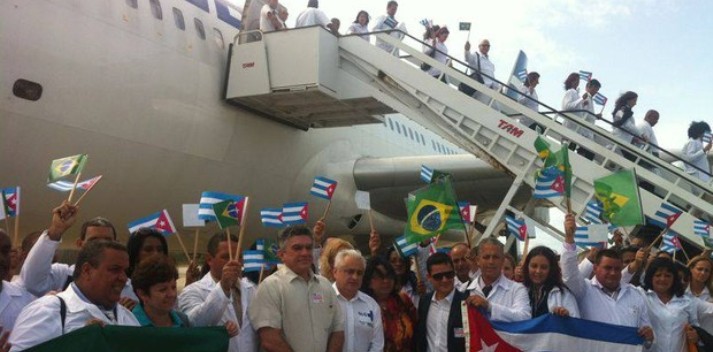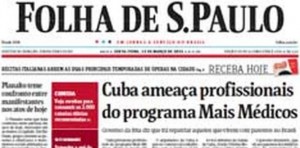
EspañolBrazil’s Mais Médicos (More Doctors) program has had a hidden agenda that goes beyond recruiting Cuban doctors to provide medical care in underdeveloped regions of the South American nation.
This according to Jornal Da Band, a Brazilian online media outlet, which obtained access to a recording of a meeting in Brasilia’s presidential palace in June 2013, shortly after huge demonstrations broke out across the country against the government of President Dilma Rousseff. The audio suggests that her government hid the true objectives of the medical program.
The meeting was between six ministerial advisors and María Alice Barbosa Fortunato, current director of the More Doctors initiative under the aegis of the Pan American Health Organization (PAHO). Barbosa is heard to voice her concern for the Rousseff administration’s preference for Cuban doctors, and decides to also deploy medical staff from Mercosur member states. Nevertheless, she admits that only 0.13 percent of the first year’s budget will go towards non-Cuban personnel.
“I can put aside R$2 million (US$620,000) to pay for [doctors from] Mercosur and Unasur … this, in relation to R$1.6 billion (US$498 million) … will this create problems for us with the judiciary?” Barbosa is heard to ask.
Another point of discussion was the form of payment for the Cuban doctors, as well as the role to be played by 50 Cuban “political commissars” that were to prevent potential desertions by the Caribbean medics from their posts in Brazil.
“I’m not going to put 9,000 doctors and 50 advisors in my deal, I’m going to put 9,050 doctors, because the advisors aren’t part of the program, and it’s the program I want to defend,” Barbosa said at one point in the meeting.
The issue of salary was resolved by Marco Aurelio García, an advisor to Rousseff who has also taken the lead in talks between the governing Workers’ Party (PT) and Venezuela. García finally decided that 60 percent of the payment should go to the Cuban government, while the other 40 percent should end up in the pockets of the individual doctors.
The decision was questioned by the Brazilian Court of Audit, which after studying the program documents stipulated that paying foreign personnel more than Brazilian doctors violated World Health Organization (WHO) recruitment codes. It also noted that both PAHO and the WHO have raised concerns about the failure of the Brazilian government to provide documents about the presence of Cuban doctors in the South American country.

There are approximately 11,000 Cuban doctors in Brazil, with local media reports suggesting this week that Havana is pressuring many to return their families to the island.
According to national daily Folha de Sao Paulo, the government of Raúl Castro fears that having their families in Brazil may encourage doctors to go off the radar and not to return to Cuba.
More Doctors is ostensibly designed to send medics to regions of the 8.5 million square kilometer country that are less attractive to Brazilian doctors.
However, political columnist Felipe Voura took to Veja.com to argue that the PT’s true objectives were “to finance the Cuban dictatorship, giving the greater part of the doctors’ salaries to the dictatorship of the Castro brothers.”
https://www.youtube.com/watch?v=Fe03u2SY_KA&t=25
The Venezuelan Experience
Havana’s preoccupation over the reliability of its health workers in Brazil follows a similar experience in Venezuela. After 11 years of the Barrio Adentro program, over 1,400 doctors have fled to the United States in the last four years alone, with the figure rising to over 8,000 since 2004.
Barrio Adentro involves the greater part of the 44,000 Cubans present in official capacities in Venezuela. The exact number of medics is unknown, as is the exact number of those who have escaped to US territory via Colombia.
The program’s capacity meanwhile no longer reportedly reaches even 30 percent of its initial reach. Of the US$1,500 that Cuba receives for each doctor (costing Venezuela $13.5 billion over 11 years), the medic himself earns less than $100 a month. The remaining quantity has effectively constituted a subsidy by the government of former President Hugo Chávez, and his successor Nicolás Maduro, to the Caribbean island’s governing regime.
Translated by Laurie Blair. Edited by Guillermo Jimenez.
 Versión Español
Versión Español












